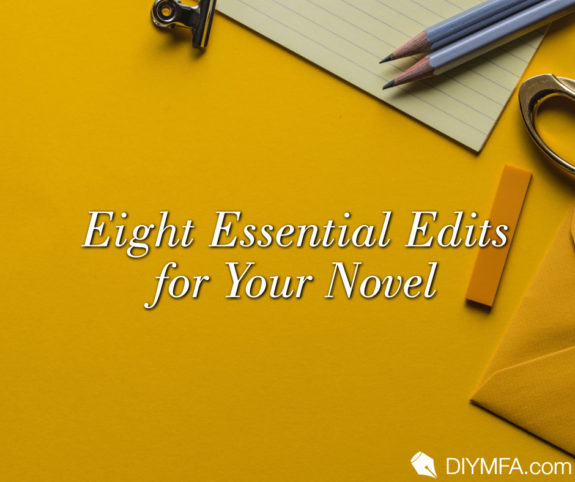From big picture elements to sentence-level style, editing is a natural and necessary part of writing. It can also be terribly intimidating. While there are plenty more aspects to review, here are eight essential things you should be editing for in your own work. Be sure to take care of these essential edits before sending your manuscript to an editor, querying an agent, or hitting ‘upload’ on your eBook.
Unnecessary Words
Editing cuts down sentences to get to the point quickly. An essential edit includes keeping an eye out for words such as Just, So, and That. These words can often be removed without changing the meaning of the sentence.
Example: “It was just the same as yesterday”
Edited: “It was the same as yesterday.”
Vague Words
Words can be deceiving. Vague terms such as Slightly, Almost, Average, and A Bit will be interpreted differently by different readers. Essential edits include crafting a sentence so it is more specific (without being wordy).
Example: “We were a bit late.”
Edited: “We were 15 minutes late.”
Adverbs
Adverbs are words that describe verbs, adjectives, and other adverbs. They tend to end in -ly and function to prop up weak words. Essential edits require using strong verbs to show action or emotion will engage readers.
Example: “She ran quickly.”
Edited: “She sprinted.”
Over-Describing
Over-describing actions creates pleonasms or subtle redundancies. You can’t shrug anything except your shoulders, and you wouldn’t blink anything except your eyes. Give the reader a little credit for understanding how the world works.
Example: “She gripped the doorknob with her hand.”
Edited: “She gripped the doorknob.”
Passive Voice
Passive voice occurs when the object being acted upon becomes the focus of the sentence. Look for Was and Were before a verb and a By after. Unless done purposefully, rework these sentences to be direct with your action.
Example: “The balloon was popped by Sharon.”
Edited: “Sharon popped the balloon.”
Dialogue Tags
When writers choose dialogue tags, they tend to get creative to avoid being boring or redundant. People don’t growl, yawn, or cry things. Stick mainly to Said and Asked. Use action to add emphasis and description.
Example: “I hate you,” she growled at him.
Edited: “I hate you,” she said, her face scowling.
Clichés
When the same word, phrase, or situation is used again and again, it becomes cliché. Avoid everything from true loves literally bumping into one another to phrases like “in the nick of time.” Create your own original descriptions instead.
Example: “He got away like a thief in the night.”
Edited: “He made an easy escape.”
Punctuation
It’s okay if you don’t get every comma in the right place, but you should at least have the basics (periods, question marks, quotation marks) down. Be consistent and review some general rules before you edit. Make this level your last round of editing.
Example: “How did you do that”.
Edited: “How did you do that?”
Extra Hints & Tips
Most people don’t benefit from editing as they go. Take some time away from your work—a day, a month, however long—then start editing. Try changing the font of your manuscript. Looking at the text in a new way will help you catch typos, repeated words, and more. You can also read aloud. If you trip over a sentence or need to take a breath in the middle of one, you might need to revise it. Finally, don’t be afraid to use editing programs, but don’t accept all changes without reviewing first. You CAN edit your work and these eight aspects are sure to tighten up your wording and make your prose shine.

Jeanette the Writer is a freelance editor and writer based in Dallas, TX. When not at the computer, you can find her crafting, teaching a scuba diving class, or posting pictures of her cats on Instagram. Visit JeanettetheWriter.com for more info and sign up for her newsletter at Jeanettethewriter.ck.page.







